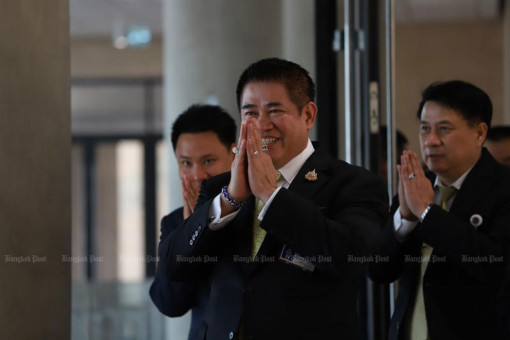
The Klatham Party’s luring of MPs from other political parties is a calculated move to boost its bargaining power as well as to support the Pheu Thai Party in case the latter severs its political ties with Bhumjaithai, according to political observers.
Klatham’s rise on the political scene is being closely watched after leader Narumon Pinyosinwat confirmed this week that more than 10 MPs from various other parties are expected to defect to it soon.
MPs are not legally proscribed from switching parties while serving unless they are expelled.
Stithorn Thananithichot, director of the Office of Innovation for Democracy at King Prajadhipok’s Institute, said the recruitment of MPs by Klatham is a medium- and long-term plan to increase its political leverage to secure more cabinet posts.
“The party definitely wants more power to bargain for more ministerial seats. Although the MPs can’t simply switch parties, they can still vote as instructed by Klatham when key legislative drafts such as the budget bill are put up for a vote in the House of Representatives,” he said.
Mr Stithorn said Klatham aims to be a medium-sized party after the next polls, which means it will be a deciding factor in the formation of a government if no party secures a decisive win. An early House dissolution will give the party an advantage, he added.
“However, Klatham is speculated to join hands with the Pheu Thai Party after the next polls unless the latter fails to meet its target,” he said.
In the long term, the party is being built to support its chief adviser, Capt Thamanat Prompow, in case the Shinawatra family washes its hands of politics, according to the analyst.
Olarn Thinbangtieo, a political science lecturer at Burapha University, said Klatham has started its move of luring MPs after its candidate Kongkiat Ketsobat recently won the by-election in Constituency 8 in Nakhon Si Thammarat with 38,680 votes — the party’s first success in the province.
The party has figured out how to manoeuvre and is capitalising on the growing tensions between Pheu Thai and Bhumjaithai to strengthen its position as potentially the third-largest party in the coalition government, he said.
According to Mr Olarn, the tension between the two parties has prompted politicians in the so-called ‘uncle’ parties to reflect on their careers and decide that they have to start looking for new parties to ensure their political survival. The term refers to the Palang Pracharath and United Thai Nation parties.
“With Klatham growing and being an ally of Pheu Thai, it has more leverage and can expect to get more ministerial posts. The MPS who are seeking new parties see this as an opportunity,” he said.
He added that Pheu Thai, which is struggling politically, will also benefit from Klatham’s rise as the latter can penetrate the provinces that the ruling party has failed to tap into.
Mr Olarn said Klatham can secure more than 30 seats in future elections because it has vast resources at its disposal and it has apparently found a strategy to counter Bhumjaithai, as seen in the outcome of the recent by-election in Nakhon Si Thammarat’s Constituency 8.
Progressive Movement core member Pannika Wanich said Klatham’s announcement about defectors is a move to bargain for cabinet seats. But she expressed doubts that the party can lure as many “cobra MPs” to successfully snatch the coveted interior minister post away from Anutin Charnvirakul, the Bhumjaithai leader.
She also harshly criticised the PP’s Chon Buri MP Krit Chevathamanon for severing ties with the party and demanded he be expelled over a conflict of ideology. Ms Pannika said the MP was elected because of the party but has since betrayed voters.

